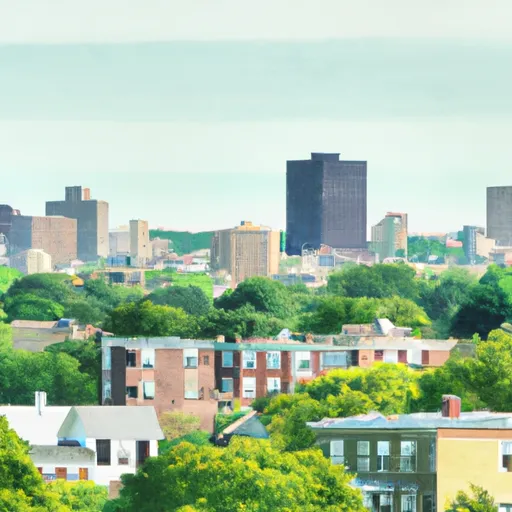-
 Snoflo Premium
Snoflo Premium
Get unlimited access to all our content
With no Ad interruptions! - Start Your Free Trial Login with existing account
Jamaica-Plain
Eden Index
Climate
9.5
•
Recreation
5.0
•
Community
3.8
•
Safeguard
6.5/10

Jamaica Plain is a vibrant neighborhood in Boston, Massachusetts that offers a unique blend of urban and natural environments. Located southwest of downtown Boston, Jamaica Plain experiences a humid continental climate, characterized by warm summers and cold winters. Average temperatures range from around 20°F (-6°C) in winter to 80°F (27°C) in summer, with precipitation distributed throughout the year.
Jamaica Plain is surrounded by several parks and green spaces, making it a haven for outdoor enthusiasts. The Arnold Arboretum, a 281-acre park managed by Harvard University, offers beautiful landscapes, trails, and a rich variety of plant species. The nearby Jamaica Pond provides a picturesque setting for activities like walking, jogging, and boating. It also serves as a crucial hydrological feature, contributing to the neighborhood's hydrology system.
In addition to these natural attractions, Jamaica Plain has numerous recreational opportunities. The Emerald Necklace, a series of connected parks designed by Frederick Law Olmsted, offers extensive walking and biking trails. Residents and visitors can also enjoy organized sports, picnicking, and community events at parks like Franklin Park and Southwest Corridor Park.
Overall, Jamaica Plain provides a diverse range of outdoor activities, blending its natural beauty with urban amenities.
What is the Eden Index?
The Snoflo Eden Index serves as a comprehensive rating system for regions, evaluating their desirability through a holistic assessment of climate health, outdoor recreation opportunities, and natural disaster risk, acknowledging the profound impact of these factors on livability and well-being.
Climate Health Indicator (CHI): 9.5
Jamaica-Plain receives approximately
1245mm of rain per year,
with humidity levels near 72%
and air temperatures averaging around
11°C.
Jamaica-Plain has a plant hardyness factor of
6, meaning
plants and agriculture in this region thrive during a short period during spring and early summer. Most
plants will die off during the colder winter months.
By considering the ideal temperature range, reliable water supplies, clean air, and stable seasonal rain or snowpacks, the Climate Health Indicator (CHI) underscores the significance of a healthy climate as the foundation for quality living.
A healthy climate is paramount for ensuring a high quality of life and livability in a region, fostering both physical well-being and environmental harmony. This can be characterized by ideal temperatures, reliable access to water supplies, clean air, and consistent seasonal rain or snowpacks.
Weather Forecast
Streamflow Conditions
Massachusetts-Rhode Island Coastal
Area Rivers
Massachusetts-Rhode Island Coastal
Snowpack Depths
Massachusetts-Rhode Island Coastal
Reservoir Storage Capacity
Massachusetts-Rhode Island Coastal
Groundwater Levels
Recreational Opportunity Index (ROI): 5.0
The Recreational Opportunity Index (ROI) recognizes the value of outdoor recreational options, such as parks, hiking trails, camping sites, and fishing spots, while acknowledging that climate plays a pivotal role in ensuring the comfort and consistency of these experiences.
Access to outdoor recreational opportunities, encompassing activities such as parks, hiking, camping, and fishing, is crucial for overall well-being, and the climate plays a pivotal role in enabling and enhancing these experiences, ensuring that individuals can engage in nature-based activities comfortably and consistently.
Nearby Ski Areas
Catastrophe Safeguard Index (CSI):
The Catastrophe Safeguard Index (CSI) recognizes that natural disaster risk, encompassing floods, fires, hurricanes, and tornadoes, can drastically affect safety and the overall appeal of an area.
The level of natural disaster risk in a region significantly affects safety and the overall livability, with climate change amplifying these risks by potentially increasing the frequency and intensity of events like floods, fires, hurricanes, and tornadoes, thereby posing substantial challenges to community resilience and well-being.
Community Resilience Indicator (CRI): 3.8
The Community Resilience Indicator (CRI) recognizes that education, healthcare, and socioeconomics are crucial to the well-being of a region. The CRI acknowledges the profound impact of these elements on residents' overall quality of life. By evaluating educational resources, healthcare accessibility, and economic inclusivity, the index captures the essential aspects that contribute to a thriving community, fostering resident satisfaction, equity, and social cohesion.

